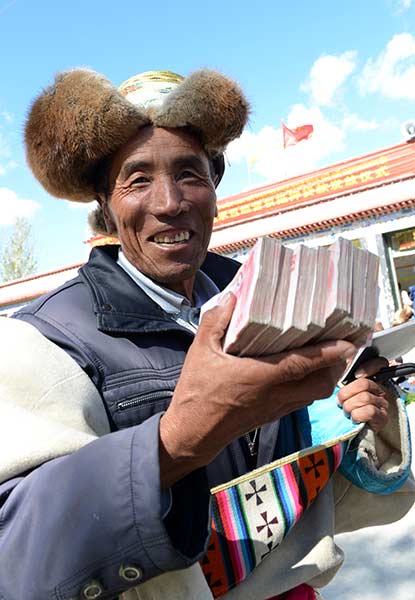Central bank gives helping hand to Tibet
By Chen Jia (China Daily) Updated: 2015-12-28 08:20|
A farmer holds money he borrowed from a bank in Lhasa, Tibet autonomous region, in August. Jue Guo / Xinhua |
China's central bank is seeking new methods to strengthen financial support in the Tibet autonomous region, aiming to accelerate regional economic development and lift local residents out of poverty in the next five years.
New financial measures, including more aggressive bank lending with relatively low interest rates in Tibet than other regions, are under discussion, according to officials and financial industry executives.
The People's Bank of China, the country's central bank, will encourage commercial banks to issue more loans to enterprises in Tibet, based on lower financial costs and required reserve ratio, according to Pan Gongsheng, deputy governor of the bank.
"Financial institutions, including banks, securities companies and insurance companies, will launch more branches in Tibet in the next five years, and the policy will support development of private banks, village banks and other micro-financial institutions in the area to expand their service coverage," said Pan.
More funds raised by those financial institutions will be injected into infrastructure construction projects, environmental protection and urban development.
The policy will focus on small and micro credit for local farmers and herders, and be used to relieve poverty, the official said.
Due to its plateau climate and relatively undeveloped economy, the financial sector in Tibet lags behind other regions in the country, and especially lacks financial professionals.
According to data from the central bank, by the end of November, 11 banks had launched branches in Tibet. Total outstanding loans reached about 205 billion yuan ($31.6), 6.8 times the amount in 2010.
In the first 11 months, enterprises in Tibet has raised fund of 21.5 billion yuan from the equity market.
In 2014, the total GDP of the Tibet autonomous region was 92 billion yuan, the lowest among all 31 provinces, autonomous regions and municipalities, which equaled only about 7.3 percent of the GDP in Guangdong province - the country's highest last year.
Xie Xuezhi, chairman of the Agricultural Development Bank, one of China's three major policy banks, said his bank will invest more than 100 billion yuan into Tibet in the next five years. It has issued 4.9 billion yuan in loans in the region this year.
Liu Shiyu, chairman of Agricultural Bank of China, said by the end of 2016 his bank plans to expand services to all villages in the region that have basic telecommunication infrastructure.
Losang Jamcan, chairman of the autonomous region, said the region is predicted to achieve annual GDP of more than 100 billion yuan this year, up 12.2 percent year-on-year.
- Policymakers drop legal ban on surrogacy
- China adopts first counter-terrorism law in history
- New law to stamp out domestic violence
- Chairman of China Telecom probed for corruption
- Newly passed laws pave way for a safer society
- NPC committee suggests deleting draft ban on surrogate pregnancy
- Chinese attend US schools at younger age
- Database directs aid for poor
- Civil aviation to add 200 more international routes in 2016
- More than money: Employees in China demand cleaner office air








